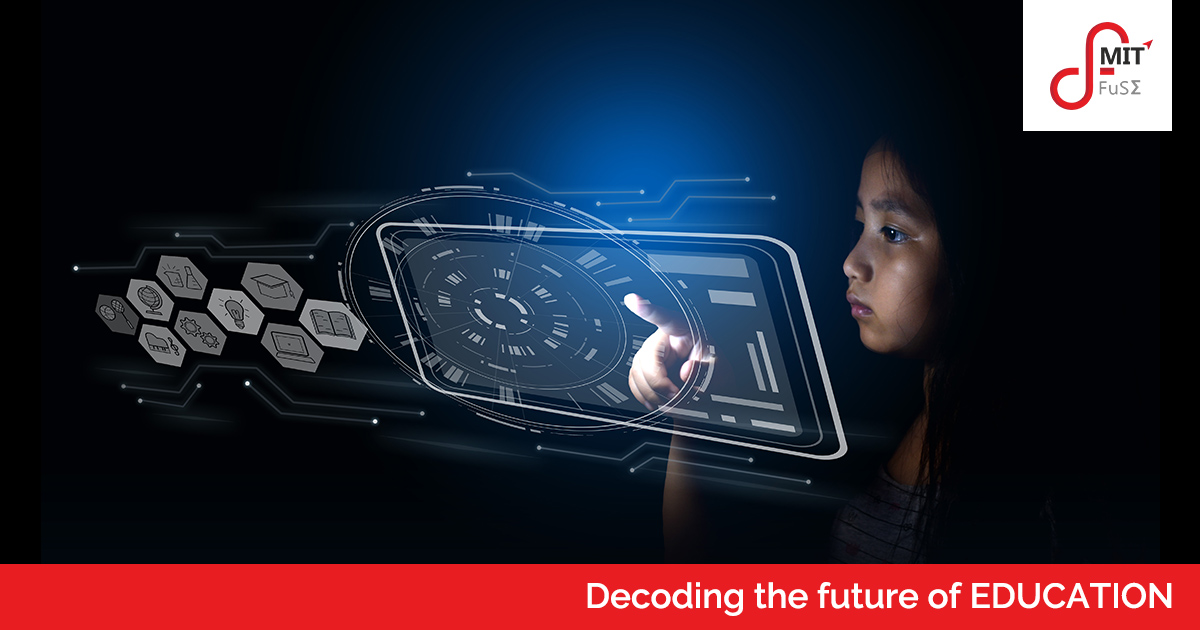Prof. Suraj Bhoyar
Project Director, MIT Centre for Future Skills Excellence
www.mitfutureskills.org
WHAT WOULD LEARNING MEAN IN THE FUTURE? And are we more and more unenthusiastic in our approach to learning in our tech-optimized environment, interested only to say “Ok Google….” in finding the right answer?
Maybe during the virtual class even, the role of teachers still remains to educate, engage, encourage, excite, and enlighten the students. During the pandemic, most of the teachers used technology to this extent first time and had to bend over backwards strengthening teaching-learning pedagogy to drive positive interaction and successful learning.The teacher’s role is evolving from instructor to mentor. In light of the new normal that the entire world has witnessed on one side and the new educational policy 2020 on the other side, the field of education has undergone a drastic change. This change has opened many platforms for reforms and there is a need to revisit, relook, rethink, and redesign every framework of education. The way learners learn today and the way teachers teach leave much to be desired. Therefore, as educationists, we need to bridge such gaps and prepare for the future through online education. Education and technology interplay is an implicit theme that vouches for the NEP 2020.
Online education will continue to gain popularity among prospective learners, both students and working professionals, powered by factors such as easy access to content on-demand, self-paced learning opportunities, and immersive and modular learning methods. Upskilling and online certification courses currently account for a substantial portion of online education, with around 40% share primarily driven by a great acceptance and adoption among IT job aspirants. Upskilling has become the norms and an increasing priority for aspirants to become more agile and collaborative at workplaces boosting productivity as well as maximizing their potential.
It is said that the illiterate of the 21st century are not those who cannot read or write but those who cannot learn to unlearn and re-learn. The future demands one to apply different gears of learning, unlearning, and relearning depending on the journey one undertakes and wishes to climb the ladder of success.
The future of education will be deeply influenced by AI & ML, blockchain, cloud computing, data science, internet of things, etc. Online education, specialized & customized Learning Management Systems, skilled human resources, and the ability to work with industry partners around the world are just some of the disruptive advantages that universities are embracing.Will we, as humans, be able to progress to a new level of learning as AI technology progresses, where the only important questions to ask are those that no person has yet been capable of answering?
Education’s potential lies in harnessing technology to make us learn faster, memorize more easily and teach better. Technology helps students to become even more interested in developing their own knowledge, and cognitive tests indicate that academic progress is crucial to learning.Artificial intelligencecan be a tool that enables us to aspire for a new age of enlightenment, which in turn transforms the teaching and learning process into something more immersive, stimulating, and engaging than ever before.
The process of acquiring information and experience is nothing but learning. The learning in future will be:
- Quality education with more accessibility
- Personalized and tailored learning anytime, anywhere
- Enhanced user engagement using gamification of concepts
- Hybrid mode of delivery for overall learning experience
- AI & big data assisted content for better understanding
- Better accessibility through cloud content
- Alternative technology enabled learning solutions
- Practical/Project based learning with internship & hands-on
- Adaptive learning &Mentoring would become integral
- Online to offline touchpoints and offline to online offerings
- Freemium Model to drive adoption
Post-graduation courses show better success compared to graduation courses in online higher education. The most of these students are either working professionals pursuing a second degree to advance their careers or students who have completed their graduation courses and are searching for a higher degree to enter the job market. Therefore, a higher degree course online that can be taken according to their individual schedules from their homes / workplaces is a perfect choice for these students.
2020 already taught us about and beyond 2021. Your desire to continue learning, no matter what you’ve already done or achieved, will drive success.





